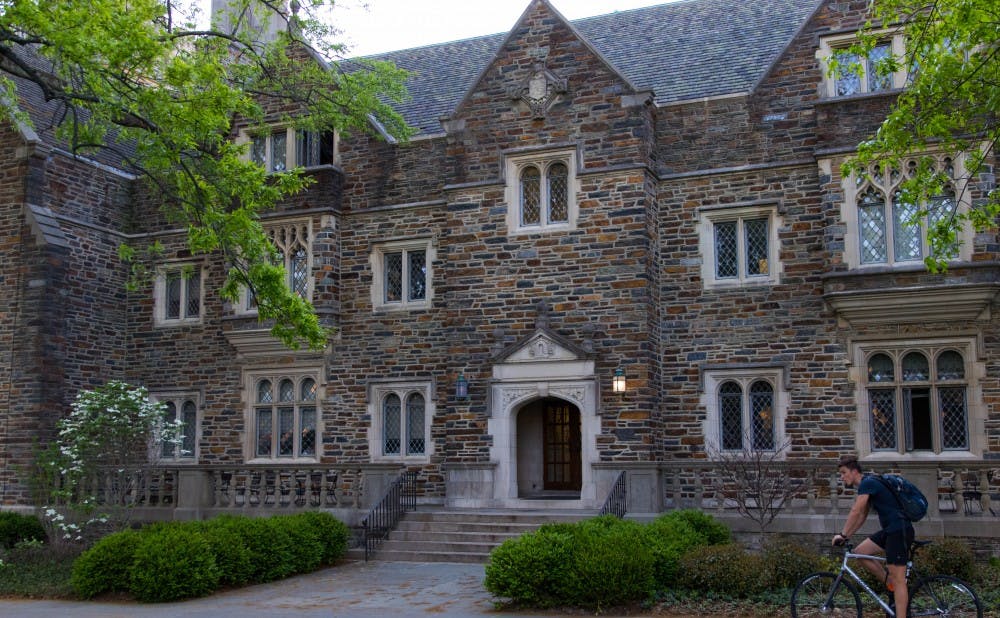Arts & Sciences Council met Thursday afternoon and resolved to vote on the final proposal for a new undergraduate curriculum in Trinity College of Arts & Sciences at their next meeting.
If approved, the curriculum will be implemented fall 2025, affecting students in the Class of 2029 and beyond.
“We’ve passed the point where we can ask the committee to go back to the drawing board or even reconsider details of their recommendations,” said Joshua Socolar, professor of physics and chair of the council. “The ball is now in our court, in council.”
The Trinity Curriculum Development Committee, which has now been dissolved, submitted its final report to be reviewed by the Executive Committee of the Arts & Sciences Council. Only Appendix I of the report was up for debate and approval by the full Council during Thursday’s meeting.
Appendix I contains the TCDC’s final recommendations for the curriculum update across seven categories: liberal arts, first-year experience, writing, language, major, course credits and residency requirement.
The most significant changes to the current curriculum are to the Areas of Knowledge and Modes of Inquiry. These would be replaced by a new system that requires students to complete two courses in each of six categories: Creating and Engaging with Art (CE), Humanistic Inquiry (HI), Interpreting Institutions, Justice and Power (IJ), Investigating the Natural World (NW), Quantitative and Computational Reasoning (QC) and Social and Behavioral Analysis (SB).
Students may take up to two “century courses,” which would each fulfill two of the twelve distribution requirements. Additional century courses would fulfill only one requirement.
The new curriculum also features “constellations” for first-years, a set of three interconnected courses that explore a thematic concept from multiple angles. One of the courses must be a first-year writing course; of the other two, one must be taken in the first semester and one must involve small-group learning.
The proposal added a third possible pathway for students to fulfill the language requirement: a 300-level course in one language and two courses in another language.
Socolar noted that if adopted, the proposed curriculum would be “subject to further review and framing over the coming years.”
The Council is tasked with updating the Trinity curriculum roughly every 15 years. The current curriculum was established in 2000, with a minor adjustment made in 2004. An update was attempted in 2017, but the council failed to reach a consensus concerning the proposal.
In March 2022, then Provost Sally Kornbluth and Dean of Trinity College Valerie Ashby charged the Council with renewing the curriculum, following the TCDC’s creation in February 2022.
The TCDC, chaired by Scott Huettel, professor in the department of psychology and neuroscience, submitted the first proposal for a revised curriculum in January 2024. Huettel reviewed the changes between the initial proposal and the current version up for approval at Thursday’s meeting.
The original proposal included a liberal arts requirement titled “Exploring Civilizations and Cultures.” This was changed to “Interpreting Institutions, Justice and Power” in response to concerns that the category was too similar to the “dated view” expressed in Curriculum 2000.
Huettel expressed that the TCDC believes the new category “better represents the current state of the scholarship and courses that our students will need to experience in the core curriculum.”
One other major change was made to the century courses, which were originally designed to fulfill two distribution requirements in the same category. Based on faculty feedback, the TCDC approved the development of Century courses that fulfill requirements across two different categories.
Huettel clarified that courses included in constellations may have prerequisites, but the constellation as a whole may not.
The proposal states that Arts & Sciences administration will coordinate with ECASC to create an implementation committee on May 1, consisting of faculty, administrative leaders, academic deans, representatives of support services and students.
Gunther Peck, associate professor of history, asked about possible processes for amending the curriculum going forward, now that the development process is concluded. Socolar responded that the council has the option to suggest changes to the language at any point, but stressed the importance of approving the curriculum in its current form at the next meeting.
“If you think this is a good, solid platform for moving forward, but you want, perhaps, some tweaks to it, it would be better to give us the time over the summer to think about those than to try to rush them through before we vote,” Socolar said. “I just think it’s crucial that we get to a vote in April.”
Get The Chronicle straight to your inbox
Sign up for our weekly newsletter. Cancel at any time.
He acknowledged that parliamentary procedure permits amendments, though none were proposed during Thursday’s meeting.
Ryan Kilgallen contributed reporting.

Zoe Kolenovsky is a Trinity junior and news editor of The Chronicle's 120th volume.

